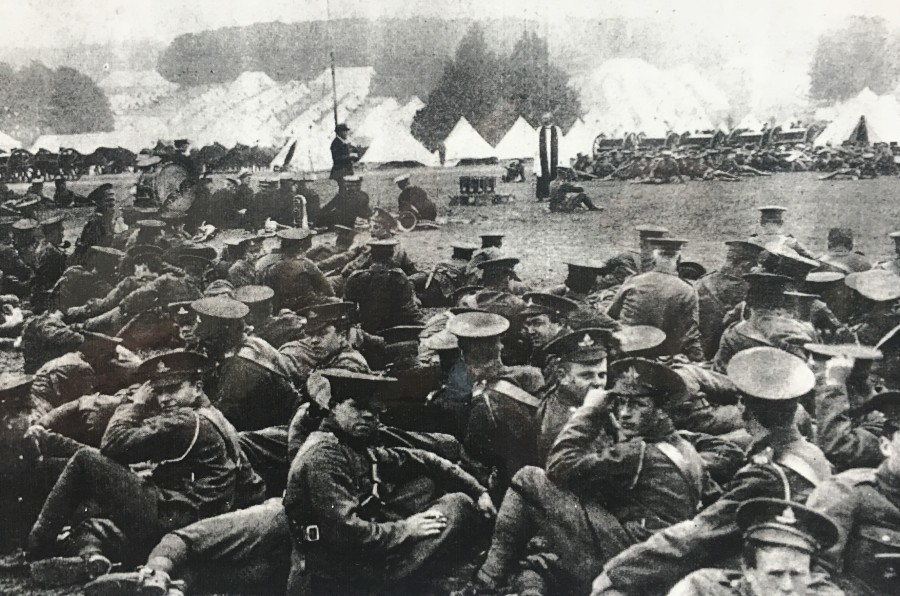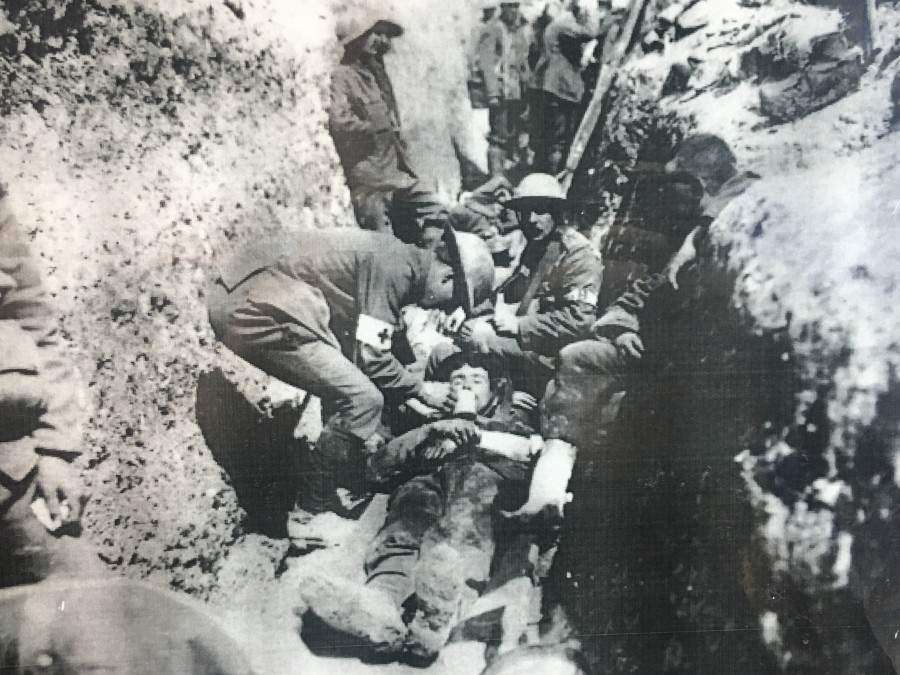Kieran’s Our City, Our Town Article,
Cork Independent, 18 October 2018
The Recruitment Dilemma
Sunday 20 October 1918 brought the supporters of Cork Sinn Féin and the World War I Recruitment Office clashing again at a recruitment meeting of the Grand Parade. The Cork Examiner recorded an angry crowd of some thousands present, who interrupted and prevented the speakers from their orations. Previous to the meeting military bands promenaded the principal streets. aeroplanes flew over the city and dropped literature in connection with condemnation of the sinking of the RMS Leinster. The vessel operated by the City of Dublin Steam Packet Company, served as the Kingstown-Holyhead mailboat until she was torpedoed and sunk by German submarine UB-123 on 10 October 1918.
Mr Maher Loughnan, BL who was given a quiet hearing, said he presided in the absence of Mr Harold Barry, the County High Sheriff. He considered it not only a pleasure but a duty to address them, for he was there for no imperial motive whatsoever.
Captain Irvine, on coming forward, was greeted with groans and hisses. For some time this continued from a section of some hundreds right in the centre of the crowd. After a while there was a lull, and Captain Irvine began by saying; “I have great pleasure in addressing you today, but before I speak to the subject proper I want to tell you of my little experience in the South. I came from the North, and there the South has a reputation of breaking up meetings. I don’t believe any Irishmen will prevent a speaker”. The men in the crowd then began to sing the Soldiers’ Song. The chairman appealed for order and asked them to give the gentleman a chance. The singing continued, and voices shouted; “You will get no recruits here”, and “You are like a statue-up there, we will give you no chance”, and counter shouts of “Up the khaki”, to which voices answered: “Up the rebels every time”.
Captain Irvine was unable to proceed and resumed his seat. A funeral passed; Captain Irvine, directed attention to the fact. His voice did not carry beyond the immediate area of the waggonette, and it was not until he stood to attention that the crowd became aware of the passing cortege.
Captain Irvine began again: “Men of Cork. I am here today to ask you to avenge the Leinster”. The hissing and booing broke out afresh, and Captain Irvine asked, “Do you cheer those men who sank the Leinster? Do you cheer the men who committed every outrage imaginable in this war?”. The singing now was taken up, and there was much hissing and jeering, and some counter-cheering. To this, Captain Irvine said: “Men must be absolutely misguided who cannot listen to sound argument – men who cheer an abominable outrage like the sinking of the Leinster. I am perfectly certain there are thousands of men in this assemblage who hate and detest every outrage that the Germans committed, and I think it a great pity that a few men in the crowd should try to stop a man telling that which he believes to be true, and give honest reasons why men should at the present moment, instead of cheering the Germans should help the Allied cause”.
The singing all the time continued, and some replies made by people in the crowd were not heard. Captain Irvine orated; “It is not sportsmanlike, or playing fair with the fair name of Ireland, which had a reputation for sportsmanship, and I believe at least the vast majority of Irishmen are sportsmen, and it seemed a great pity that a few should try to sally her fair name. If you wish to be represented at the Peace Conference as a nation, how can you expect it if you are not going to give the Allied cause, the winning cause, the fair play it deserves?”.
The rival parties ended up shouting at each other, and neither had the slightest chance of hearing a Lieutenant O’Riordan who was introduced. Freedom, nationality, and liberty was the cause he espoused, and he believed that to that sacred cause the young men of Cork were prepared to listen. He shouted above the din, “As an Irishman I ask the men of Cork to follow in the footsteps or those glorious sons of Cork, the Munster Fusiliers. That local regiment shed undying lustre on Cork, and their memory would live as Irishmen who had fought for the glory of their country”. Throughout his speech the noise was incessant, and the meeting looked angry J B Connolly, a prisoner of war in Germany, faced the meeting and also attempted to address it but with no better success.
As the speakers proceeded to leave, there was a surge towards them. They walked towards the City Hall, followed by a few hundred persons shouting and booing. They were pressing in on the speakers, and the police drew their batons. There was a general stampede, and in the rush some persons got baton strokes, while others dodged and narrowly escaped being trampled-on. The baton charge, which lasted for a few minutes, was indiscriminate, but as far as could be ascertained no one was injured. After some time the place cleared, and no further incidents took place.
Captions:
968a. Irish Soldiers of the 16th Division during World War I (source: Cork City Library)
968b. Irish Soldiers in the trenches on the western front of World War I (source: Cork City Library)
Kieran’s new book, Cork in Fifty Buildings (2018, Amberley Publishing) is now available in Cork bookshops.
Kieran is also showcasing some of the older column series on the River Lee on his heritage facebook page at the moment, Cork Our City, Our Town.

